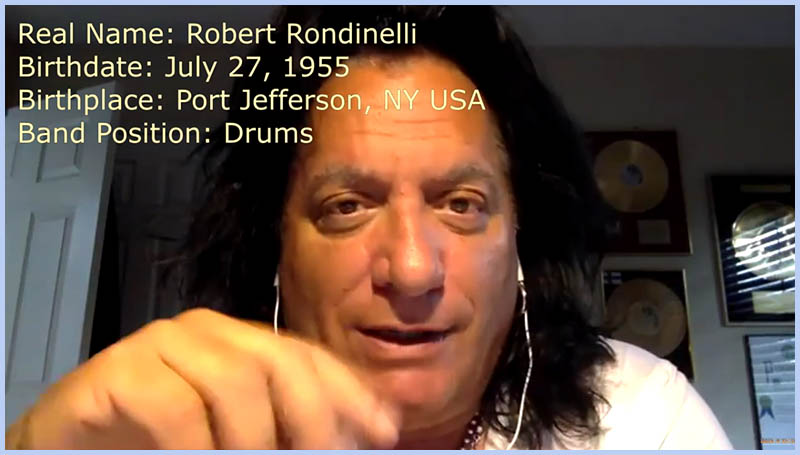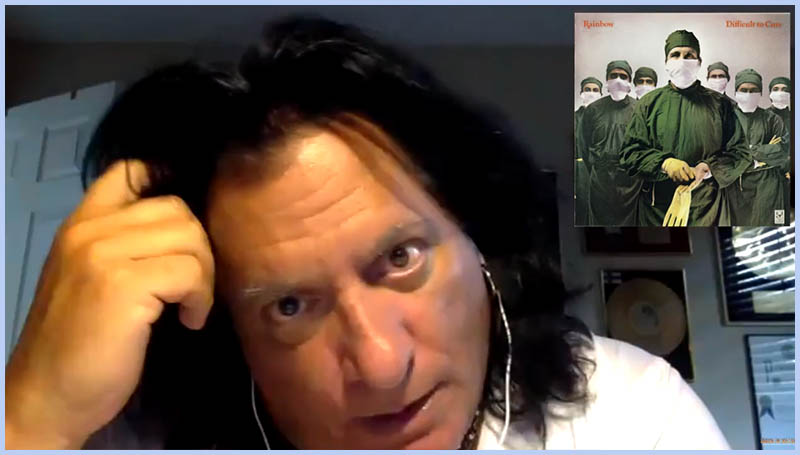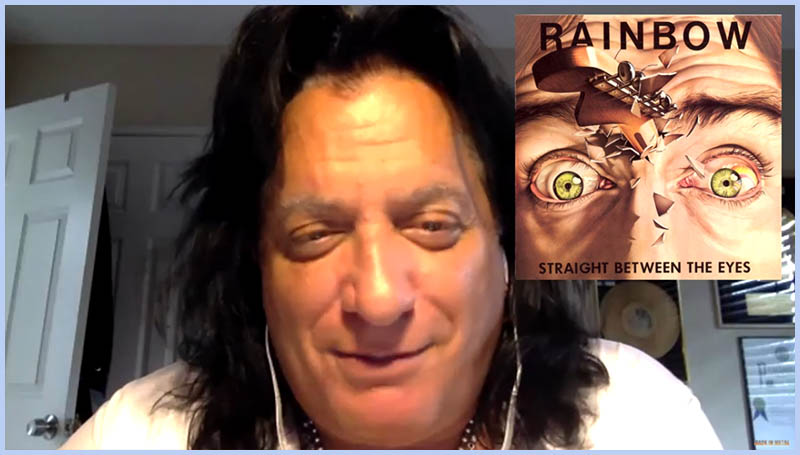|
BOBBY RONDINELLI Made in Metal Interview 2021  This year we are celebrating the 40th Anniversary of the release of the Rainbow album, "Difficult to Cure" and the drummer Bobby Rondinelli takes his time to remember the details related to his job recording this CD and "Straight Between the Eyes" in 1982. How are you today, Bobby? Good. How are you? I am really fine. I saw that you participate in the last Intelligent Music Project entitled "The Creation". Tell me, how were you involved in the recording? I got an email from Milen who was the head of the project. You know, if I was interested in playing on the record and. I spoke to him the next day on the phone. And that was a Friday when I spoke to him, and by the next Wednesday I did everything, eleven tracks, it was all done. And then everything was very smooth and a really nice project to work on. They are very proud of their project. But we are here talking because this year we celebrate forty years since the release of "Difficult to Cure", the first Rainbow CD where you participate. Do you remember how did you get the drummer position in Rainbow? Yeah, actually, I had been trying to reach Ritchie cause I heard Cozy was leaving and a friend of mine knew a friend of Ritchie's and said, and this friend of mine owned the recording studio. So he said, my friend said to this guy friend of Ritchie, why don't you get Bobby an audition? So the guy says, why should I? What's in it for me? So my friend that owns the studio says, I'll give you 30 hours free your time. If you get Bob the audition... he doesn't even have to get the gig, but if you get the audition, I'll give you 30 hours free studio time, right. So that's one side of it. Now I'm playing with the band on Long Island called Samantha. We were, our equipment was robbed and we were doing a gig on borrowed equipment and this guy coming. Twisted Sister and Zebra then did a benefit for my band because our equipment got stolen. But I didn't know that there was a guy at the soundcheck. Right. He was in prison and he got like four hours good behavior to go out. And he knew some of the guys in the band. So he came to the soundcheck and he heard me showing the drummer of Twisted Sister who asked me to show them something I do. So I showed it to him. I don't know any of this is going on. So now I'm playing a gig on borrowed equipment. And this guy comes up to me after the show and he goes: Hey, my name is Barry. I go, Hi. He goes, I'm a friend of Ritchie Blackmore's. So I go, really? I've been trying to get in touch with him. He goes, great, because he's here and he wants to meet you. And he tells me that he was at the soundcheck and now he's out of jail altogether. So he says, I heard you play at the soundcheck for the, you know, when your equipment was stolen. And I brought Ritchie down to see you. And he's here and he wants to meet you. So he takes me in the back room. I meet Ritchie and he says, you know, and I was up for the gig, at Kiss at the same time. So Ritchie said to me, hey, I like to hear you play goes up. If you don't get the gig in Kiss, I'd really like to get together and jam. I said, well, I'd like to get together and jam anyway, you know. You know, this is the kind of music I'm into, so we got together and played and it sounded great and he asked me to join, take some time to think about it. And after a few days, I called Ritchie and I said, you still want me in the band? He goes, Yeah. I says, Well. I said, look, I was never a Kiss fan. But I was always Deep Purple and Rainbow fan, so if you still want me, I'll do it. So I said yes, he said yes, and a few days later, I got a letter from Kiss saying, "no, thank you". So it worked out. It worked out OK.  Yes. It's very, very interesting, Bobby. But when you join Rainbow, did you go directly to recording "Difficult to Cure" or, did you play some live concerts? They had one more gig with Cozy after I joined the band, at Castle Donnington. So they flew me to Donnington so I could see the show and then we went to Denmark to record. But I had never even played with anyone but Ritchie, me and Ritchie jammed and I never played with Roger or Don Airey or Graham Bonnet at the time because Graham Bonnet was still the singer. Yes, we went right into the studio. Now that you tell me this is really interesting to me. Yes. To record this album, the band moves to Copenhagen. How was the meeting with the rest of the band? Simply, Ritchie, come and said, this is Bobby the new drummer and that's all? Oh no. It was worse than that. Before I went over, we had a meeting with Ritchie and Bruce Payne, who was the manager and a conference call with all the other guys in the band, and Ritchie goes, hey, everybody, say hello to Bobby. You know, he's a new drummer. And everybody says, great, we'll get together and jam and see how it goes. And Ritchie goes, No, no, no, no, no. And I'm saying, it's OK Ritchie. I'm saying I don't mind to play with them, you know what I mean? It's like, you know, Cozy was a big name. I get it, you know and Ritchie goes, "No, he is the drummer". Ritchie, he is taking the Cozy's place. Do you think we should get together and play? And I'm go to Ritchie, it's OK. I don't mind it. And Ritchie, go. This is how it starts. Ritchie goes. You could all get on your bikes if you don't like it. He's the new drummer. I went, so I was forced down their throat, not by my choice. I was fine to play with them, you know. But Ritchie said, you know, he's the drummer. You don't like it, you're out. So the initial meeting might not have been the best, but it had nothing to do with me. Suddenly you were involved in a situation that was really delicate is a really funny. It's the usual Ritchie Blackmore. Did you feel comfortable at Sweet Silence Studios? Yeah, the studio was great. And we used Flemming was the engineer and he was just an engineer and a big producer, you know, Metallica and all that. And yeah, Sweet Sounds was a good studio. I remember that in the 80s the budget were really big. And for this reason, I would like to ask you, how was the recording process for you? Did they tell you, "you have one or two days to record everything" or it was relaxed? No, no, no, no, no. Because we rehearsed a few days before we went into the studio in Copenhagen and we only had maybe two or three ideas. Everything else was written in the studio, you know. So Ritchie plays a riff with jam and all? That's good to record it. You know, one song was sent by Russ Ballard, "I Surrender" and he wrote, "Since You've Been Gone", which was Rainbow biggest hit song. So and that's how Graham Bonnet got out of the band, because they played "I Surrender" in the control room and Ritchie asked everybody, what do you think? And everybody says: Well, good, good song. Great song. Good song. Yes, Graham, what do you think of the song? Graham and Graham goes, Well, it's all just words and music, isn't it, Rich? I'll never forget that. Well, it's all just words and music, isn't it Rich? We didn't see Graham again. Ritchie left the room. Next day we have no singer, so we're there for like over a month. We're going to be there for a month. And on the second, the third day, we have no singer. So all the songs were written with no vocalist, you know? And then the guy, Barry, that found me, that told Ritchie about me, told Ritchie about Joe. So me and Ritchie and Barry went to see Joe play a college. And I think in Staten Island, New York. And that's how Joe became the singer. The same guy, Barry, that got me got Joe. And then he got Rosenthal. Yes. Barry was a good guy, he knows music. Did you know Joe Turner before or not? No. Do you remember if there was a difficult song for you to play in the studio or alive? Probably the hardest one in the studio might have been "Difficult to Cure" because there's so many parts, but not hard to play. You've got to remember, no pro tools back then, you know.... Did you feel a sense of pressure because you were fitting the shoes of Cozy Powell? Look, I loved Cozy, but I knew I could do it. Sure there's pressure because he was such a big name, but I was confident in myself, you know, and I'm not Cozy and he's not me, I just try to be me and not really. I didn't think of it that way. I thought of it as I belong here. You know, that might sound weird, but it's true. I always I when I was a kid, I would never say if I make it, I would say when I make it, I'm going to do this or that, you know what I mean? Yeah, but I love Cozy too, Cozy was great Absolutely. And we were friends. The first time Rainbow was in Spain was in nineteen eighty one. There was a concert on July the 3rd in Barcelona and July the Fourth in Madrid with UFO and Def Leppard, do you have any special memories about those concerts? Yeah, I remember it well because Ritchie would always play jokes on the other bands. Yes. And he sent his roadie in, who was like the crazy guy, you go in to bother UFO and Phil Moog, and him and Phil had a big fistfight, big fight. I read that on the newspaper. Yeah, big fight. And then I never saw anything like it, really. All blood, Phil Moog is a good fighter. And then after the fight, he went, all right, lads, let's go on stage. And he went right on stage. Right. Boom, boom, boom. Let's go on stage. A little crazy.  In this concert. Ritchie Blackmore wanted to play before UFO, and it wasn't the plan. This is the reason because they fight. Now that you told me Ritchie Blackmore is famous for making bad taste jokes. Did you suffer this behavior during the tour? The next record "Straight Between The Eyes", you know. Ritchie hated that I could sleep well because he couldn't sleep well. So, you know, we all had our own room. We had a house, a guest house in Canada and he got a boom box. You know, the song "Rolling the Ball" by Kate Bush? Well, he made a tape loop of just that, rolling the ball, rolling the ball, rolling.... and would put it outside my fucking room to wake me up every morning because he was up and didn't think I should still be sleeping if he couldn't sleep. So, yeah, he was always doing something. And one night we took... and it was snowing, we took everything out of Dave Rosenthal's room. And set it up outside in the snow, just like his room, the bed, the tables and lamps, chairs. He came down to breakfast the next morning, he was freezing because he had to take everything in himself and it was out in the snow. He was cold. Ritchie always like to do crazy things like that. So tell me, why did you leave Rainbow? It was just becoming time. You know, Ritchie's like a vampire. We were very close, very close to a couple of years. Then we started not to be so close. He always likes new blood and I don't know why I lasted more than most. I don't know. But it was it was a great experience for me. But was it a friendly farewell? Well, a farewell is never that friendly, you know what I mean? It was what it was. So Bobby, taking account of your musical career, do you think that playing in Rainbow was a good résumé to be taken later in bands like Black Sabbath or Blue Oyster Cult? Of course, you know, when you play with Ritchie, he puts you on the map, you know what I mean? Because as Ritchie was known for playing with great musicians. So you played with Ritchie. Now, you're going to get noticed whether they like you or not. People are going to look they're going to pay attention to go, oh, he's OK or not so good, you know? But yeah, the best thing I ever did was joining Rainbow. Yes. I have the idea that Tony Iommi for a reason that I don't understand, he always wants to take musician that comes from Deep Purple or Rainbow. Ronnie James Dio, Glenn Hughes, you... Ritchie never really made bad musical decisions as far as musicians. I mean, every you know, every Black Sabbath lineup was not, and I'm not going to name names like pristine, like perfect, but Rainbow was always great, whether you might like this version better than this version, but they were always very good. And Ritchie, as far as singers, you know, he went from Ian Gillan to David Coverdale and Glenn Hughes together, smart move, Graham Bonnet, which you wouldn't figure was the best fit, actually they had the biggest Rainbow song, 'Since You Been Gone'. Then he found Joe, Ronnie Romero, and Dougie White always picked good guys. Ritchie has a good eye for talent. Do you have some plans for 2021 or 2022? I think I'm going to be doing the next Intelligent music album and with Axel Rudy Pell we just released a cover album. That came out last month or a few weeks ago. We're going to do an actual band album again towards the end of the year, which is nice. Hopefully tour then after, in 2022. And right now I'm co producing a project to Leslie West tribute album. You know Leslie from Mountain? Yes. Yeah. We got some cool guys on it. We got Slash, we got George Lynch from Dokken, we got Robby Krieger from the Doors, Randy Bachman from Bachman Turner Overdrive, Elliot Easton from The Cars, Steve Morse from Deep Purple. Charlie Starr, the Megadeth guitar player named... what's his name? No, not the lead guitar player. He did very good. He played great on it, I'm sorry I forgot his name, but yes, I'm coproducing that record. You know, we got Joe Lynn singing a few songs. Ronnie Romero singing a few songs. Dee Snider singing a few songs and it's coming real good. So thank God I've been busy. © Tony Gonzalez, Made in Metal / Hush Magazine - December 10, 2021 |